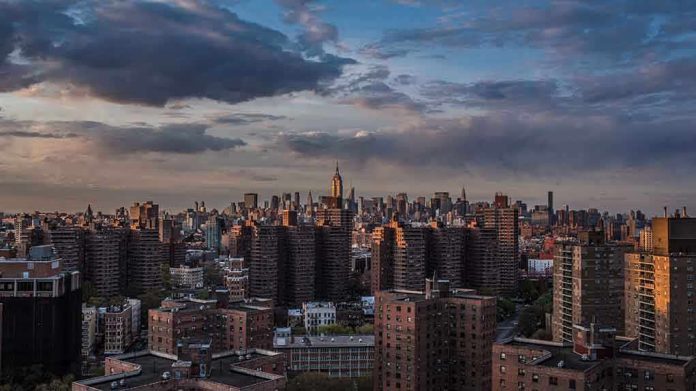
Jewish community groups have issued stern warnings and mobilized in response to Zohran Mamdani’s victory in New York City’s mayoral race, sending shockwaves through a city already wary of progressive overreach and threats to traditional values.
Story Snapshot
- Jewish organizations publicly express concern after Mamdani’s election, citing his record on Israel and public safety.
- Mamdani’s progressive platform and identity mark a sharp ideological shift in New York City leadership.
- Generational divides among Jewish voters signal waning attachment to traditional pro-Israel politics.
- Advocacy groups are preparing to monitor and challenge the incoming administration’s policies.
Progressive Victory Raises Alarm Among Jewish Leaders
On November 4, 2025, Zohran Mamdani was elected as the first Muslim and South Asian mayor of New York City, defeating both Curtis Sliwa and Andrew Cuomo in a race marked by record turnout from younger and minority voters. This victory, celebrated by progressives, has triggered immediate concern from several prominent Jewish advocacy groups, who argue that Mamdani’s past statements and policy positions—especially regarding Israel and public safety—are out of step with the needs and values of their communities. The leadership of organizations such as the Jewish Community Relations Council and the Anti-Defamation League has responded with public warnings and calls for vigilance, urging their members to prepare for potential policy shifts that could erode public safety and weaken longstanding support for Israel.
These warnings come as Mamdani’s administration readies its transition, with Jewish leaders expressing particular anxiety over proposals to reform city policing and alter funding formulas for community safety. Many see these moves as a direct challenge to the stability and security they have long advocated for, fearing that so-called “public safety reforms” could open the door to increased crime and undermine law enforcement’s ability to protect vulnerable populations. The tension is heightened by Mamdani’s association with democratic socialist causes and his vocal criticism of traditional U.S.-Israel relations, both of which have been lightning rods for criticism from more conservative and centrist Jewish voices in the city.
Generational Divide Exposes Shifting Political Landscape
Polling from July 2025 revealed that while 43% of Jewish New Yorkers overall supported Mamdani, a striking 67% of Jewish voters under 44 sided with him—an indicator of profound generational divides within the community. This split reflects a broader trend of younger voters embracing progressive candidates, even as older leaders warn of jeopardizing key alliances and support for Israel. For many Jewish organizations, Mamdani’s win is not just about one election, but about the potential unraveling of decades of coalition-building and influence in city government. The shift also raises questions about the future of pro-Israel advocacy in New York politics, with some fearing that the city could become less friendly to Jewish concerns if progressive platforms continue to gain traction among younger generations.
Despite these divides, Jewish leaders have emphasized the need to remain engaged and proactive. Major organizations are already scheduling meetings with Mamdani’s transition team, while also mobilizing grassroots efforts to hold the new administration accountable on issues ranging from antisemitism to public safety. The situation has exposed fault lines not only within the Jewish community but across New York’s broader electorate, as traditional alliances are tested by rapidly changing demographics and ideological realignments.
Advocacy Groups Mobilize for Oversight and Accountability
In the wake of Mamdani’s win, advocacy groups have wasted no time in organizing forums, issuing public statements, and launching new monitoring initiatives aimed at tracking the incoming administration’s actions. The Anti-Defamation League, for example, has rolled out a “Mamdani Monitor” to scrutinize policies affecting Jewish residents and to provide regular updates to the community. These efforts underscore a deep-seated skepticism among many Jewish leaders about the direction in which the city may be headed—particularly given Mamdani’s stated commitment to progressive reforms and inclusivity, which some interpret as code for policies that could dilute community safety or marginalize traditional values.
At the same time, Mamdani has publicly affirmed his intent to govern inclusively and engage with all communities, pledging to address concerns about safety and antisemitism. Whether these assurances will allay the fears of Jewish advocacy groups remains to be seen. The months ahead are likely to be marked by intensive dialogue, heightened scrutiny, and potentially contentious debates over the future of New York City’s policies and priorities. If history is any guide, the engagement of vigilant community organizations will play a decisive role in shaping the outcome and preserving the core values at the heart of the city’s identity.
Jewish groups issue post-election warning to Mamdani as he prepares to lead New York City https://t.co/vs7UUoraHF #FoxNews
— Bo Snerdley (@BoSnerdley) November 5, 2025
The stakes could not be higher for those who believe New York’s success depends on upholding public safety, supporting traditional allies, and resisting radical shifts that threaten the fabric of the city. As advocacy groups prepare for the challenges ahead, their response to Mamdani’s election serves as a crucial reminder of the need for active oversight and principled resistance to any agenda that undermines constitutional freedoms and community security.
Sources:
2025 New York City mayoral election – Wikipedia




